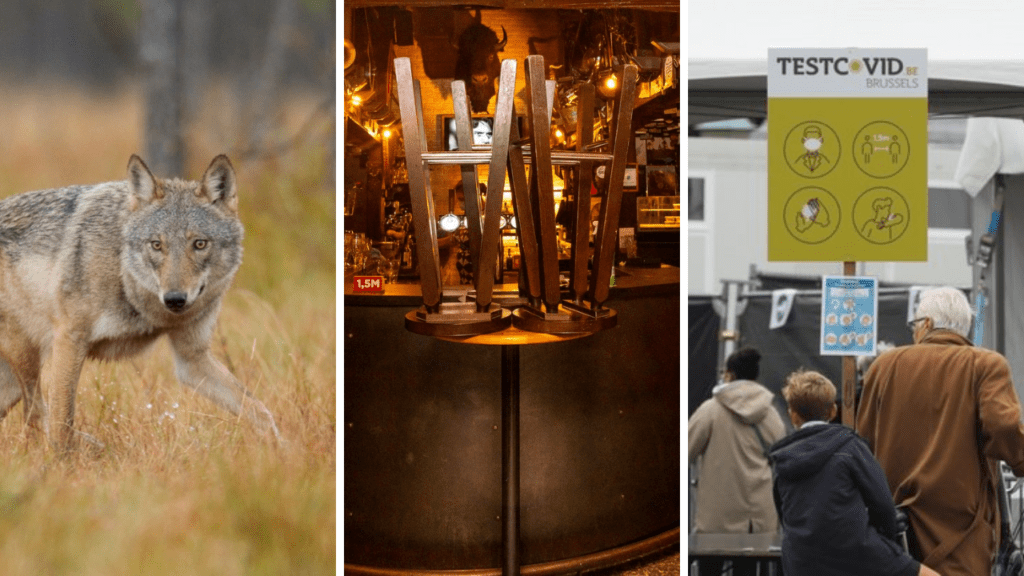With Belgium's new coronavirus measures entering into force from today, bars and cafés have to adhere to stricter rules than restaurants, even though the distinction between the two has been called "inexplicable" by some.
Across the country, bars are limited to groups of maximum four per table and have to close at 11:00 PM, and have to shut down completely in the Brussels-Capital Region, while nothing changes for restaurants.
For Flemish Minister-President Jan Jambon, the difference depends mostly on people’s behaviour, as well as on their alcohol consumption.
“In bars, you start drinking until you – so to speak – go outside again. In restaurants, you come to eat,” he said on Flemish radio. “I am sure that, in a restaurant, there will also be a few people who drink too much and start shouting or singing. But these are rather exceptional cases, whereas this happens more often in café life.”
The distinction is not justified, according to the Belgian Brewers umbrella organisation, which demands “evidence-based policy,” as they say there is no sufficient data that shows that bars and cafés are “infection hotspots” – as Federal Health Minister Frank Vandenbroucke said when announcing the new rules on Tuesday.
“In fact, official statistics from our neighbouring countries show the opposite,” they said, referring to official figures from the Netherlands, which show that 3% of infections take place in the hospitality industry.
So, what else is happening? A Belgian wolf was found dead, EU citizens will not be able to enter the UK with an ID card from October 2021, and the coronavirus figures rise sharply.
Belgium in Brief is a free daily roundup of the top stories to get you through your lunch break conversations. To receive it straight to your inbox every day, sign up below:
1. Recap: which new measures start today in Belgium?
As Belgium’s new federal government and the Brussels-Capital Region both announced different coronavirus measures earlier this week, here is a recap of which restrictions go into force from today.
The rules, announced by new Federal Health Minister Frank Vandenbroucke, will stay in place from Friday 9 October, for at least one month, after which they will be evaluated.
If your head is splitting from constant news, here's a recap to get you up to speed.
2. Bar or restaurant: Brussels decides on the difference

In addition to bars, tea rooms, coffee shops and cafeterias, cafés serving food in the Brussels-Capital Region also have to close for one month, according to the Ministerial Decree that was published in the Belgian Official Journal on Thursday.
As there was some confusion about what constituted a bar and what constituted a restaurant after the measure was announced on Wednesday, the official text was necessary to know how the new rules would be enforceable, according to Yves Stevens of the National Crisis Centre.
According to the Decree, “places for the consumption of drinks, excluding restaurants” will have to close for a month. Read more.
3. Belgian average surges to nearly 3,000 new coronavirus cases per day
An average of nearly 3,000 additional people per day tested positive for the new coronavirus (Covid-19) in Belgium over the past week, with a peak on Monday of over 4,600 positive tests in one day, according to Sciensano’s latest figures on Friday.
Oer the 7-day period from 30 September to 6 October, an average of 2,916 new people tested positive, which is an increase of 72% compared to the week before, meaning the number of new infections rises sharply. Read more.
4. Belgian wolf found dead in Limburg

A wolf was found dead along a motorway in northeastern Belgium on Friday, a nature organisation reported, saying it was likely that it was one of four puppies born this spring.
“What Welkom Wolf feared became a reality last night: early this morning, Welkom Wolf received a call about a dead wolf on the N74 [motorway] near Hechtel-Eksel [in Limburg],” the organisation wrote online. “Chances are it is one of Noëlla and August’s cubs.” Read more.
5. Belgium pressured to replace Huawei products in 5G rollout
Telecom operators Proximus and Orange will gradually replace the telecommunications equipment of China’s Huawei with products from Finland’s Nokia, sources close to the case told Reuters press agency on Thursday. Read more
6. Brussels’ plans for highway toll could cost drivers over €2,000 each year
Plans to install a highway toll to enter the territory of the Brussels-Capital Region could cost drivers more than €2,000 a year, a Walloon senator warned.
André Antoine, former regional minister in Wallonia and senator, slammed the plans by the Brussels government as a “racket,” saying it would weight down on the budgets of drivers who enter the Belgian capital daily. Read more.
7. Brexit: EU citizens can’t enter UK with ID card from October 2021
Any EU citizen looking to travel to the UK will need to use their passport from October 2021, following a decision from London that the ID card is not enough.
According to the update on future border management, the UK believes that the ID card is not secure enough, with the new regulation calling on EU citizens, as well as Swiss, Norwegian, Iceland and Liechtenstein residents to bring their passport for future travel.
Negotiations on the future relationship between the UK and the rest of Europe have been ongoing, with president of the European Council Charles Michel telling British Prime Minister Boris Johnson on Wednesday that it is time for the United Kingdom to “put its cards on the table” regarding Brexit. Read more.
Jules Johnston & Maïthé Chini
The Brussels Times

